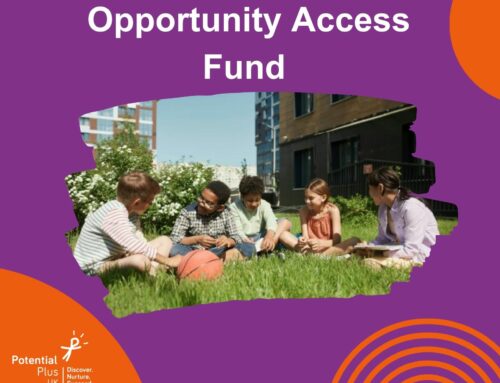This blog explores how schools can create confident, successful learners from the outset. Strategic, early mentoring, underpins the nurturing of academic skills and routines needed for sustainable lifelong learning habits. This is particularly pertinent for disadvantaged and disengaged high potential learners. Whilst it is obviously useful for all learners, schools are very unlikely to have the capacity to work with large numbers in this highly focused way. Each school will need to identify the exact group to target.
The Education Endowment Foundation (EEF) Report on Mentoring (updated July 2021) found robust evidence that mentoring can add the equivalent of 2+ months per school year but needs to be well-structured.
Role of the High Learning Potential Lead
Identify your mentors
Choose your mentors carefully. What is most important is that the learners being mentored feel special and are inspired by their mentor. Mentors must be committed to the programme and have an attitude of availability for their group of learners. There is some evidence to suggest that mentors who volunteer for the role are less likely to drop out and that the mentoring is likely to be more successful. (EEF)
In secondary schools and Further Education Colleges, mentoring for high potential learners will work best if the mentor is a teacher and able to draw on their pedagogical expertise to motivate and teach aspects of the subject. For example, if the mentee needs additional help with Chemistry, the best person to do this would be a Chemistry teacher.
The High Learning Potential Lead might choose to mentor key learners, for example, those exceptionally high potential learners or those who are disengaged. Being a mentor provides a role model for others and enables the Lead to evaluate the programme from the inside.
Identifying high potential learners for mentoring
In principle, select those learners with the greatest need. The reality may be that the numbers will be determined by the capacity of mentors. It is likely that disadvantaged and disengaged learners will be the priority.
The EEF Report indicated that some studies found more positive impacts for disadvantaged learners, at least in part through the development of trusting relationships with an adult. Similarly, there was greater impact for non-academic outcomes such as attitudes to school, attendance and behaviour.
The EEF report also found that the impact on Maths was greater than on reading or science which may influence your decisions on the selection of learners to target.
Start by deciding the selection criteria, for example, underachieving, anxious, disruptive, potentially the first in the family to go to university, chaotic home life. Discuss this with the Phase Lead in primary schools or Head of Year in secondary schools as they will have the most detailed picture of the learners across the curriculum.
Create the programme and plan the timescale
Decide if the mentoring will be weekly or fortnightly. The EEF report identified the greatest impact was when meetings took place weekly or more frequently, and when mentoring programmes lasted a year or more. However, the positive impact tended not to be sustained once the mentoring stopped, so the timescale needs to take account of this fact; for example, if the learners are due to sit external tests or exams, the mentoring should continue into this period.
Try to tie it into the pastoral curriculum. For example, if tutors are focusing on creating record cards, build this into the mentoring programme at the same time, so learning can be consolidated in mentor meetings.
We have a Suggested Programme Template with some pre-populated ideas for you to adapt (or create your own).
Match the mentors with mentees
The relationship with the mentor is crucial to the success of the programme. Consider building on existing relationships. In primary schools, try to avoid the class teacher being the mentor.
High potential learners may have characteristics which limit their achievement, for example, fear of failure, strongly held opinions, inability to concentrate when unchallenged. Try to match these learners with empathetic mentors.
Decide how many learners will work with each mentor. Consider putting learners into groups of 3, ensuring that the learners will be a good fit. This:
- Makes the number manageable for mentors
- Provides peer support for learners in a small supportive group
- Minimises the impact of absence on group sessions
- Enables mentors to meet the learners in small groups to save time
Induct the mentors
Invest time at the beginning to ensure that mentors are knowledgeable, well-prepared and engaged. Make them feel valued and fully informed before students know who the mentor will be. This will avoid mentees approaching the mentors before they are sure of the programme details.
Provide mentors with information about the characteristics of high potential learners, plus data and any other relevant information about their mentees.
Mentor drop-out can have a detrimental effect on mentees so it’s important to make sure that mentors are committed and well-supported to reduce the likelihood of mentors leaving the programme (EEF 2021).
Induct the learners
Get all the mentees together. Tell them that they have been chosen based on their potential to excel. Explain how the programme will help them succeed and that their potential has been recognised.
Give them the Getting to Know You questionnaire to complete before the first mentor meeting as it will provide a starting point for discussion with the mentor.
Leave them feeling lucky to be chosen, inspired and excited by the opportunity.
Work with parents/carers
Let parents/carers know that their child has been chosen. Explain that the child has great potential to do well academically, yet needs to refine their study skills. If mentors have the opportunity to introduce themselves to parents/carers, encourage this, as this personal contact is particularly important for disadvantaged parents and will provide them with a known person to contact if they need to. Parents’ evenings or performances are a good time to do this.
Monitor and evaluate the programme
Check in with the mentors and learners from time to time. Ensure meetings are taking place and going well, and be available for any glitches. Be prepared to adapt the groupings if necessary.
Organise a more formal evaluation half-termly, taking feedback from mentors and mentees so that the programme continues to meet the needs of learners whilst remaining manageable for mentors.
The Mentoring Role
Time commitment
Mentors should expect to spend 10-15 minutes weekly, sometimes per learner and sometimes as a group of three. There is likely to be some follow up with subject/class teachers, for example, if a learner is struggling with Geography, the mentor may need to talk to the teacher.
Communications with mentees
Mentors need to set up an online group for communications. For example, on Teams so that they can be in regular contact with reminders and updates, and to send good luck messages for tests and mocks.
Communications with parents
Mentors should contact parents at least once. Making this a positive experience for parents will have long-term benefits for learners, and parents will have a named person to contact with any worries (particularly important for disadvantaged families who may be reluctant to contact an unknown teacher).
Learning as a Whole Group
Bring the whole group together for time-efficiency. For example:
- In a primary school, Year 6 mentees can meet Year 7 children so that they can ask questions and hear about a typical day in secondary schools.
- For Key Stage 3, provide time with students from a range of backgrounds who are highly successful in Key Stage 4.
- At Key Stage 4, invite Key Stage 5 to talk about revision, life in the Sixth Form, things that they wish they had known.
- For Key Stage 5, invite role models from a range of backgrounds to talk about life beyond school at university, in apprenticeships or work, and to provide insights into time management.
Further Thoughts and Ideas
Here are some additional ideas you may wish to consider.
- At the final session, mentors may want to write a personalised card to the mentee to wish them the success mentors know they are capable of.
- For disadvantaged mentees about to take exams, consider providing a see-through pencil case, ruler, 2 black pens, a pencil and some basic Maths equipment. Include record cards and post-its.
- In some secondary schools, Form Tutors in Years 10 and 11 are chosen to provide a range of subject expertise. This allows learners to be regrouped in form time to work with a subject specialist. For example, learners who need help with Maths can be together for daily input on Maths for a period of time whilst others focus on Sciences etc.
Final Thoughts
“Programmes which have a clear structure and expectations, provide training and support for mentors, and recruit mentors who are volunteers, are associated with more successful outcomes.” (EEF)
We wish you successful, rewarding and purposeful relationships in your mentoring programme. Targeted well, high quality mentoring will have a lifelong impact on high potential learners at risk of underachieving.
Resources
- Helping You Learn Questionnaire for Key Stages 1 and 2
- Getting to Know You Questionnaire for Key Stages 3, 4 and 5
- Progress data for each mentee
- Some Typical Characteristics
- Mentoring Programme template
- If the budget can stretch to it, a card for each mentee
- Basic equipment for exams and revision for disadvantaged learners.
References
Mentoring Report, The Education Endowment Foundation, July 2021 https://educationendowmentfoundation.org.uk/education-evidence/teaching-learning-toolkit/mentoring
About the Author: Mary Phillips: Potential Plus UK Schools Advisor
Mary was the Head of English before moving to Yorkshire to set up her own consultancy, specialising in education. She works with senior leaders and classroom teachers as a coach and mentor. She facilitates a wide-range of professional learning and has lived experience of the challenges and joys of living with a child with high learning potential.
About the Author: Joy Morgan: Potential Plus UK Trustee
Joy was a senior leader in London schools until August 2021, responsible for professional learning and for high learning potential. She has helped many schools to develop their policy and to improve their practice for high potential learners. Joy is passionate about securing excellent outcomes for disadvantaged learners. Her extensive experience within schools is invaluable to the team. Joy continues as a Trustee of Potential Plus UK.






